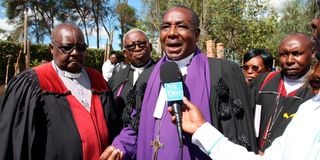Premium
Church must speak a lot louder

Rt, Rev. Patrick Mutahi Thegu, the Moderator of the 23rd General Assembly speaks to journalists at Molo Parish PCEA Church in Nakuru County during the 35th Anniversary on April 2, 2023. The PCEA is more than 130 years old in Kenya, but in all that time, only a handful of its clerics have ever raised their voices against misrule, injustice, government overreach, or corruption.
I was born and bred in a Christian family. To be precise, I didn’t have much choice but to join the Presbyterian Church of East Africa, (PCEA) because my dad made sure to enrol my brothers and sisters, willy-nilly, as members of our local church.
I have reason to believe that among my siblings, I am the only member left and I, therefore, have a special affinity to this denomination of the Protestant Church. So far, it has played a significant role in my life, and in that sense, I have no business casting aspersions on it.
But when I came across a press statement released on Tuesday after a meeting of eminent persons organised by the General Administration Committee of the church’s General Assembly — perhaps the most important date in PCEA’s calendar — I was dismayed, to say the least.
The church leaders might as well have kept their peace instead of delivering a statement so bland and uninspiring that it induces huge yawns. Nowhere did I detect any denunciation of government failures or credible solutions to the country’s woes. Even political correctness has its limits.
Throughout history, the church has been more trusted than governments, except in the peculiar circumstances where the church and state join forces, which are rare.
The PCEA is more than 130 years old in Kenya, but in all that time, only a handful of its clerics have ever raised their voices against misrule, injustice, government overreach, or corruption. The voices of church leaders have been largely muted when compared to those of shepherds in other denominations who raise the alarm whenever they foresee danger, spiritual or secular.
The problem with PCEA is that although it belongs to the World Alliance of Reformed Churches, it is hardly reformist; it is, in fact, the most conformist of denominations.
Besides saving lost souls from eternal damnation, which is its principal mission, its secondary mission should be to speak out when things go wrong. In the history of the church, the only time its leaders spoke out was during the Moi era when some were brutalised for telling the king that he was not just naked but also covered in sores.
However, this is not exactly what I read in the PCEA statement after the meeting that took place a week ago. To be fair, the church hierarchy has always chosen to be non-confrontational on political issues, but that is not to say it must seek to accommodate the authorities on every issue.
When the struggle for the second liberation was in full gear, only a few intrepid souls stood out to be counted. The Rev Dr Timothy Njoya’s name immediately comes to mind in that respect, but only because he chose to join those struggling against Moi’s tyranny in the streets.
Forced oathing
However, the church has had other luminaries who quietly influenced the course of events, among them the late Right Rev John Gatu, his successor as Moderator of the church, Dr George Wanjau, and a few other ministers who have served well.
The Rev Gatu was, for instance, the first to denounce forced oathing in the Mt Kenya area during Mzee Jomo Kenyatta’s rule. But what is the church saying now that the country has to contend with an atrophying economy, a battered shilling, widespread hunger and insecurity, joblessness among youth, and a seemingly clueless lot at the top?
A few samples will suffice. On food insecurity, the statement says: “Inadequate food supply… is caused by…uncontrolled subdivision of agricultural land, perennial rain insufficiency and outdated farming methods.” According to the church, the solution lies in mechanised farming, irrigation and the adoption of modern technologies.
On the cost of living: “PCEA recognises the government effort in containing the cost of living even if there is a slowdown in the economy coupled with the depressed shilling….We urge the government to address the taxation on basic goods and address drivers to the rising cost of living.”
On corruption: “The church appeals to the government and its agencies to demonstrate goodwill in fighting this menace to building the confidence of the citizens.”
The government is hardly likely to spare the time to read such effete entreaties, especially at a time of political turbulence. But to be fair, the church does pronounce itself clearly on non-political issues.
It is concerned, for instance, with the easy availability of “alcohol, opioids, coca, cannabis and other substances” and calls for a multi-sectoral strategy to prevent the vice. It is also dead set against the emerging LGBTQ+ “threat”. On this last, of course, the church and state are in total agreement.
While not advocating a firebrand response on the part of the church to all emerging crises, there is a feeling that it should speak out louder and more frequently to keep the government on its toes.
This is especially so at a time when members of the Pentecostal movement are said to have become an appendage of the state, thus tainting the entire church. It is time the church disassociated itself from allegations of state capture because millions of Kenyans depend on it for solace in times of trouble.
Mr Ngwiri is a consultant editor; [email protected].





